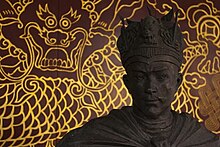Li Xiucheng
| Li Xiucheng | |
|---|---|

Li Xiucheng
|
|
| Nickname(s) | Philanthropist |
| Born | 1823 Teng County, Guangxi, Qing Empire |
| Died | 7 August 1864 (aged 40–41) Jiangning, Nanjing, Qing Empire |
| Allegiance |
Qing Empire (to 1849) Taiping Heavenly Kingdom (to 1864) |
| Years of service | 1852–1864 |
| Rank | Field Marshal |
| Battles/wars |
Eastern campaign
Western campaign
|
Eastern campaign
Western campaign
Li Xiucheng (Chinese: 李秀成; pinyin: Lǐ Xiùchéng; 1823 – August 7, 1864) was a military commander during the Taiping Rebellion. Born to a peasant family, he was known as the Loyal King (忠王) by the end of his life. This title was bestowed after he refused a bribe from a Qing general officer to kill Hong Xiuquan, the founder and leader of the rebellion. As a general, he led Taiping forces to several victories. After his capture and interrogation at the third and final Battle in Nanjing in 1864, he was executed by Zeng Guofan. By the end of the rebellion, Li was the most important military leader of the rebel forces.
Army Group Jiangnan (江南大營) was an important Qing army barracks in Nanjing. Forces led by Li Xiucheng besieged the barracks in an attempt to force its occupants to surrender. Li Xiucheng, besides; in the second encirclement, the Qing army commanded 200,000 soldiers to fight with Taiping forces from March 1858, but they were routed by Li Xiucheng in May 1860. After that, Li went on to occupy all of Jiangsu provinces except Shanghai.
Li Xiucheng's palace in Suzhou is the only one from the Taiping Rebellion that exists today. In July 1863, Li ordered his daughter's husband, Tan Shaoguang, to capture Suzhou. But Li Hongzhang led the Huai Army combined by the "Ever Victorious Army," which, having been raised by an American named Frederick Townsend Ward, was placed under the command of Charles George Gordon. With this support, Li Hongzhang gained numerous victories leading to the surrender of Suzhou.
...
Wikipedia
